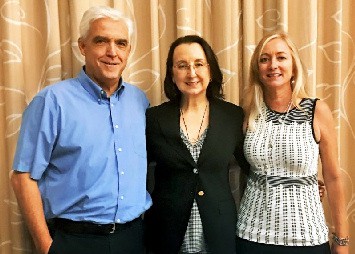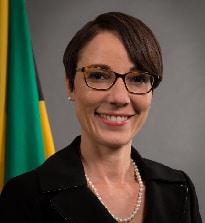Leverage Tech to Tap Untouched Market Segments Expert Urges

KINGSTON, Jamaica – Discounting the notion that the unbanked and underbanked are low volume contributors to bottom line, fintech expert, Kathryn Chin See says that there are substantial benefits regional financial institutions can reap by leveraging financial technology (fintech) to serve them. However, they must transition urgently.
Opening Phoenix International’s webinar on Financial Inclusion in Emerging Markets organised in partnership with Microsoft and TD Synnex streamed live from the Corporate Offices of The Jamaica National Group on March 13, Ms Chin See, product manager at MC Systems, the JN member company which owns Phoenix International, argued that although digital transformation became a necessity a decade ago, many regional institutions continue to lag behind, allowing international players to tap into their market space.

Despite the benefits to be derived from digital transformation, including lower costs and barriers to entry in new and promising markets, as well as swifter onboarding, service delivery, credit application and adjudication processes, adaptation in the region has not been fast enough Ms Chin See maintained, although she acknowledges some ground was gained during the COVID-19 pandemic.
She underscored that regional institutions could compete effectively with larger global fintechs and big techs if they rethink their approach.
“International players have deep pockets. They are raising the bar for customer experience,” she argued. “Local financial institutions have a strength though- a deep understanding of the Caribbean market. Insert any trendy P2P wallet (also known as money transfer apps) here- they don’t know us [so] it won’t stick. Capitalize on the trust and cultural knowledge that global players can’t replicate,” she urged.
She continued: “The goal is not to copy. The goal is to outsmart global disruptors in ways that resonate with your customers. The time to deliver on that goal is now.”
Emphasising that fintech is essentially about people, Ms Chin See argued that instead of focusing on the immediate profit and losses, regional institutions should instead be keen on the “lifetime value” customers generate. Using Maria, the farmer in-need of a loan for seeds, and Joseph, an entrepreneur who relies on informal channels because of limited access to traditional financial systems, Ms Chin-See argued that many regional financial institutions lose out on the opportunity to capitalise on the potential of the unbanked and underbanked because they have not digitally transformed their services.
“It’s not just about profit and losses, it’s about people,” she said. “We have the power to unlock their potential to build stronger communities and economies, but it starts with rethinking our own institutions.”
The fintech expert said by leveraging technology, institutions can maintain a high level of engagement with customers, especially those considered underbanked, noting that the technology allows institutions to garner great insight into who their customers are.
“Let’s think about Granville the taximan. He has a 30-year-old [Toyota] Corolla. He has maybe $100,000 in the bank. He saved it for emergencies. But suppose we engaged him? Suppose we targeted him and offered him a credit card to pay for his fuel everyday and service parts and offered him a motor loan to get a new car that’s efficient. Suppose we offered him a mortgage,” she mused openly. “That $100,000 client is now transformed into a $30 million client.”
Engagement should also be leveraged through the experience provided to the customer, Senator Dr Dana Morris Dixon, Minister without portfolio in the Office of the Prime Minister, with responsibility for Skills and Digital Transformation, emphasised, as she delivered greetings to open Wednesday’s webinar.
“If it is not easy for people to use, then you’ve not made their lives easier,” she stated.
“People have to be at the centre of it and this is what I say to our government entities ‘it’s nice to put new services online, but if you don’t re-engineer the process and make it easier for people, then we would have lost’. And that is also what I say to the financial sector. It needs to be intuitive and very easy to understand or else we’ve left people behind again,” she added.
She disclosed that the Jamaica Data Exchange platform is now in the final stages of development and that the platform will make the verification of government data seamless.
“As banks try to put more products online — account opening and other products that you deliver online — it’s going to be important that they’re able to verify the data that is submitted by their clients,” Dr Morris Dixon underlined.





